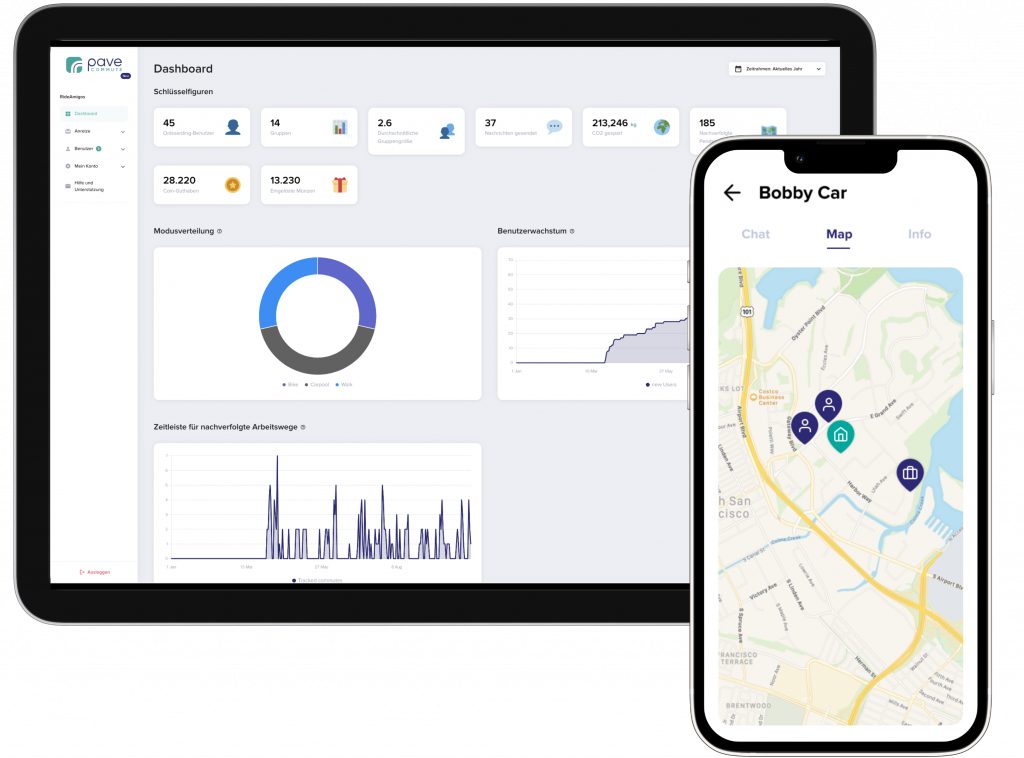Job-seekers increasingly want to work for companies aligned with their personal values. Sustainable commuting can double as a powerful branding tool.
Parallels between employer branding and sustainable commuting have recently drawn increased attention from businesses. Emerging labor market research indicates that job-seekers show a steadily increasing desire to work for organizations that share their personal values. Embracing sustainable commuting is an easy and effective way for employers to enhance their appeal while generating important secondary benefits.
With Pave Commute, employer organizations put powerful sustainability tools in the hands of their commuters. This innovative, award-winning app makes it easy for people to connect with smarter modes of transportation. Employers can use Pave Commute to make a difference starting with sustainable commuting.
Pave Commute helps businesses make smooth, efficient, and effective transitions to transportation sustainability. It can also serve as a powerful adjunct to organizational branding efforts that generate big advantages.
What is employer branding?
Let’s begin by examining the concept of employer branding and its importance.
Marketing experts often trace the origins of employer branding to “The Employer Brand,” a 1996 paper co-authored by the organizational theorist Tim Ambler and the consultant and commentator Simon Barrow.
“The Employer Brand” asked whether the same marketing concepts businesses use to sell their products can also apply to organizations at a human resources level. Ambler and Barrow concluded not only that similar concepts do apply, but also that they have a strong and quantifiable impact.
Since the mid-1990s, businesses have become increasingly focused on branding themselves as desirable employers to gain and maintain competitive advantages. The trend has become more pronounced in the internet and social media ages.
Employer branding and sustainable commuting have become increasingly linked as climate change emerged as one of the 21st century’s defining issues. As businesses have sought to improve their sustainability profiles, their support for smarter alternatives to solo driving have significantly strengthened.
How to use employer branding to align values with employees and job-seekers
Value alignment occurs when an employee or job-seeker sees their own ideals reflected by their employer (or potential employer). It imbues the employer-employee relationship with added meaning. This, in turn, tends to lead to higher levels of job satisfaction and lower levels of turnover among mission-driven employees.
Sustainability is a major area of focus for businesses seeking to advance their employer branding objectives. It resonates with a broad cross-section of the general public, making it more likely to have a positive impact on both current and prospective employees. Sustainability also offers broader social and environmental benefits, making it a win-win proposition.
Younger workers and job-seekers are particularly interested in sustainability and corporate social responsibility (CSR). Millennials and Generation Z (“Gen Z”) members are particularly drawn to opportunities with CSR-focused employers. A 2022 survey by PricewaterhouseCoopers (PwC) found that nearly two-thirds of Millennial and Gen Z respondents said it’s important for them to work for a company that has a demonstrated commitment to CSR.
Deeper relationships between employer branding and sustainable commuting
Beyond value alignment, employer branding and sustainable commuting share other links. Employers that embrace sustainable transportation solutions also show concern for their employees’ physical and mental health, and for their ability to achieve a positive work-life balance.
Here’s why:
- Sustainable transportation is good for both physical and mental health
- Employers can help increase local demand for sustainable commuting alternatives, which contributes to better funding and development
- Meaningful support for alternatives like hybrid work and telecommuting create better balance between employees’ professional and personal lives
By supporting sustainable commuting, employers can show not only that they care about the environment, but also that they care about their employees both when they are and aren’t on the clock.
Strategic and competitive advantages follow from sustainability-focused employer branding
Concerted efforts to advance employer branding and sustainable commuting generate multiple important strategic and competitive advantages. These benefits impact businesses’ bottom lines, sometimes to significant degrees.
Here’s how your company can benefit from a strong commitment to sustainable commuting:
Attract top job talent
Experts agree that the post-pandemic economic landscape has reshaped the labor market heavily in favor of job-seekers. Intense competition for the best available job talent has become the norm, and businesses need every advantage they can get.
Notably, money is far from the only motivating factor. A 2021 survey found that many employees would happily accept a pay cut in exchange for an easier commute. Robust, flexible, and well-supported sustainable commuting policies can position your business as an appealing option in a tight job market.
Improve retention rates
Sustainability is a central corporate social responsibility focus. Scientific research has demonstrated that effective CSR strategies significantly improve employee retention rates.
When your best and most productive employees are happy, they are far more likely to stay on board for the long term.
Reduce recruitment costs
According to the Society for Human Resource Management (SHRM), it costs about $4,700 to hire and train a new employee. For large organizations with high turnover rates, this can add up to hundreds of thousands or millions of dollars.
Commute-related pain is one of the major reasons people quit their jobs. By easing that pain by helping get people out of their cars and into smarter alternatives, you can reduce the likelihood of losing employees for commute-related reasons.
Cut spending on healthcare benefits
Support for active modes like cycling, jogging, and walking is a key aspect of employer branding and sustainable commuting. These commuting modes improve employee health, reducing the amount of time lost to illness-related absenteeism. They also tend to trigger decreases in organizational spending on healthcare-related employee benefits.
Engage employees
Sustainability initiatives have a positive impact on employee satisfaction and engagement. When employees see their organization actively embrace sustainability, it imbues their work with a sense of pride and purpose. As such, sustainability-oriented organizations often succeed in building an internal culture of innovation, collaboration, and employee empowerment.
These effects contribute to higher levels of employee engagement and job satisfaction, which improves business performance.
Connect employer branding and sustainable commuting with Pave Commute
Pave Commute makes it easy to advance employer branding and sustainable commuting efforts. Our powerful yet user-friendly app instantly connects commuters with others that are looking to share a ride, allows commuters to record their commutes to observe their commuting footprint, and recognizes them for every sustainable choice they make. Use Pave Commute to bolster a community of sustainable commuters at your organization.
You can launch Pave Commute with only a few clicks. Many organizations generate positive returns on their investment by winning races for top talent and reducing turnover by building stronger levels of employee job satisfaction.
Sign up your team & try it today
Try Pave Commute with your team free for 30 days. No credit card required.










